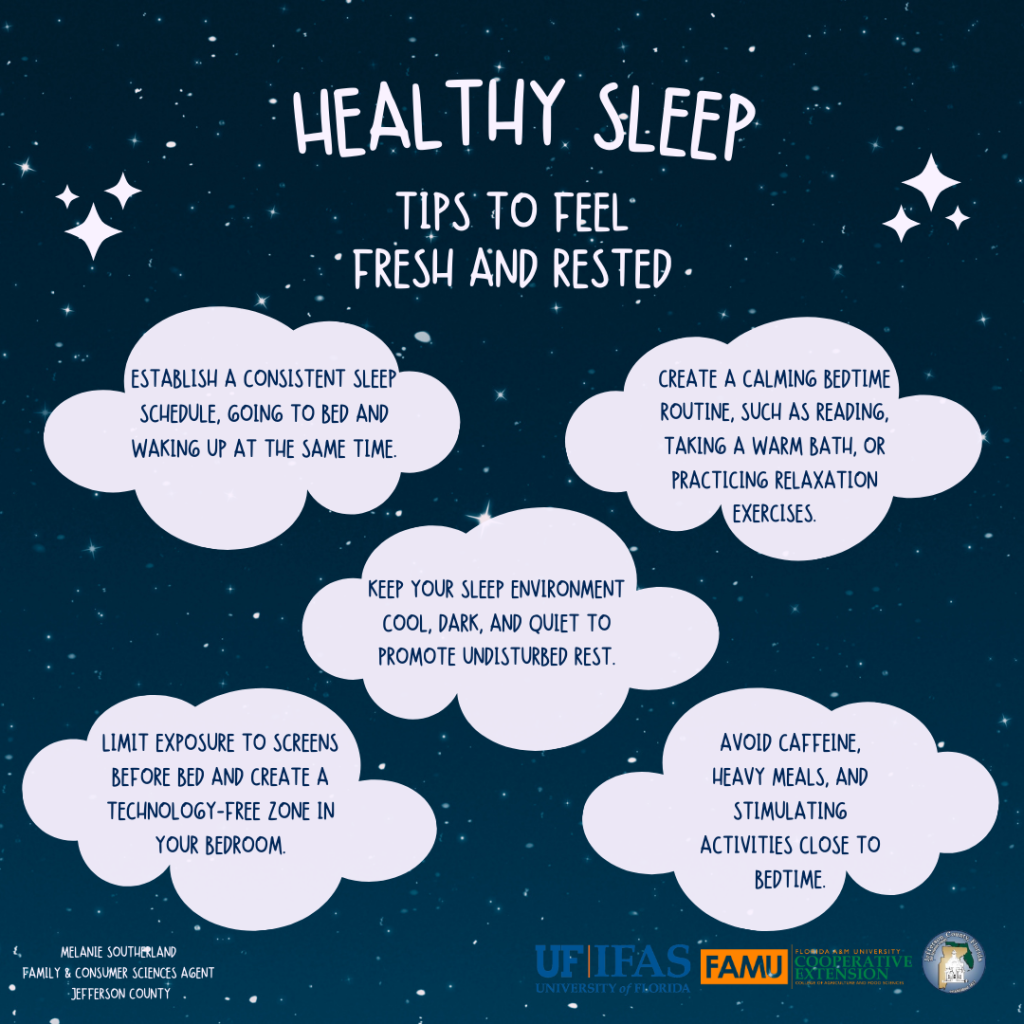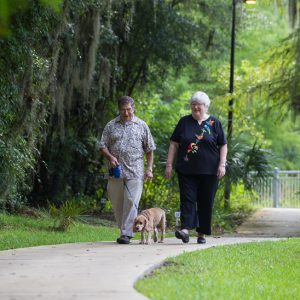by Melanie Southerland | Dec 6, 2024
Did you know that 35% of adults in the U.S. do not get the recommended 7 or more hours of sleep each night [1]? Sleep deprivation is on the rise and can negatively affect overall health. The body’s ability to function properly and to feel rested is dependent upon how much sleep a person gets. Research shows that not getting the recommended amount of sleep each night correlates with obesity, along with other chronic conditions such as heart disease, diabetes, and high blood pressure [2].
Why is this important? Obesity is one of the leading causes of chronic disease and mortality in the U.S. People who are obese are more likely to have chronic diseases and die at an earlier age compared to non-obese individuals. Some things cannot be controlled regarding overall health but there are certainly ways to reduce the risk for chronic conditions and obesity. Aim for at least 150 minutes of moderate-intensity activity per week, sleep 7-9 hours each night, and eat various fruits and vegetables, lean protein, whole grains, and low-fat dairy to support health. There are various health benefits to getting enough sleep; for example, getting sick less often, staying at a healthy weight, reducing stress, and improving mood, improving attention and memory, and improving heart health and metabolism.
Sleep quality is important in addition to getting the recommended amount of sleep, you also need to ensure you are getting quality sleep. Quality sleep includes waking up feeling refreshed and rested, falling asleep easily and quickly, and staying asleep. If you wake often, have trouble falling asleep, and wake tired, you likely are not getting quality sleep. Here are some important sleep tips that could help you improve sleep and sleep quality. It is important to wake up and go to bed at the same time each day because that sets an expectation for your body’s internal clock to shut down and wake up. A nightly routine is important because it puts your body into a system that is preparing for sleep and staying consistent can help your body to understand that it is bedtime, and rest is around the corner. Limit screen time before bed because it is stimulating to the brain, which can make it harder to get to sleep, not to mention the added stress it could cause. Consider, reading a book, listening to soft music, and journaling as part of your relaxing nightly routine. Exercise can help reduce stress so, engaging in exercise is important not just for physical health, but for sleep health too.

[1]Center for Disease Control and Prevention. Sleep and Sleep Disorders. Data and statistics: Adults. https://www.cdc.gov/sleep/data-and-statistics/adults.html
[2] Watson NF, Badr MS, Belenky, G, et al. Recommended amount of sleep for a healthy adult: a joint consensus statement of the American Academy of Sleep Medicine and Sleep Research Society. Sleep. 2015; 38(6):843-844. Doi: 10.5665/sleep.4716
American Academy of Sleep Medicine. Sleep Education. Healthy sleep habits. https://sleepeducation.org/healthy-sleep/healthy-sleep-habits/

by Marie Arick | Jun 24, 2024

(Photo source: Marie Arick)
A great beach outing includes more than just grabbing the sunscreen and a towel on the way out the door. A bit of quick planning can really aid with a successful beach outing that doesn’t require too much effort.
Staying hydrated is important. Freezing bottles of water, sports drinks or fruit drink pouches is one trick to packing a smaller cooler or an insulated grocery bag. It is dual purpose. It can aid with keeping snacks (apple slices or watermelon in resealable bags) cool and when melted, a cool drink to enjoy.
Snacks are a also good idea. Fruit, animal crackers, or pretzels are easily packed and not too difficult to manage. Another tip is to bring a trash bag to keep the beaches clean and to limit your trips to the public waste receptacle.
Sunscreen is a necessity even on a cloudy day. A sun protection factor (SPF) of 15 or more by is recommended by the U.S. Food and Drug Administration (FDA). Applying sunscreen before leaving home allows time for adequate absorption into the skin. Remember to reapply at least every 2 hours. Using an umbrella or a tent is a great way to escape the sun’s direct rays. Wearing a hat or other protective clothing can help protect from those harmful UV rays.
Have kiddos? Bringing a few toys to aid with building sandcastles keeps the creative mind going. A few simple safety rules for playing in the sand are: do not bury one another in the sand, avoid throwing sand at anyone as it could harm one’s eyes, and avoid digging deep holes. Safety is paramount and an article published in the New England Journal of Medicine by a Harvard Medical School researcher noted burying a person in the sand is dangerous as the weight of the sand may lead to suffocation. As recently as February 2024, at Lauderdale by the Sea, two children were involved in a beach hole collapse, as reported in the Miami Herald. While digging in the sand is fun, be mindful and create structures that are safe for the kids.
Finally, know your beach flags and where to locate the current beach conditions. The National Weather Service as well as the MOTE Marine Laboratory are great sites providing beach conditions, including water current risk level, UV index, and thunderstorm potential. Local beaches often have social media pages that provide specific data for that area, including the current conditions and flags. Remember, not all beaches post flags and not all beaches have lifeguards on duty.
A day at the beach is an excellent opportunity for a fun-filled day. While this may not be an inclusive list, it does cover many of the basics of a good beach day. Spending a few minutes to determine the beach outlook, gathering the day’s supplies, and following some safety rules can greatly enhance your beach day.
An Equal Opportunity Institution.

by Julie McMillian | May 11, 2020
What does your morning and evening routine consist of? Now that we are adjusting to our new normal of staying at home and social distancing, many routines are different than before. How about starting a routine of walking 30 minutes or an hour each day? There are so many positive benefits to even just adding 15 minutes to your schedule and most everyone, including children, can do it.

Walking is a great form of exercise that nearly everyone can do. (Photo source: Lyon Duong, UF/IFAS)
Walking improves your mood and reduces stress and anxiety. Who doesn’t need that kind of positive influence in their life right now? If you walk in the morning, it will provide you with energy for the rest of the day and walking in the evening helps you to sleep better at night. Taking a few extra steps each day can add some time to clear your head and add to your energy level while creating a positive mindset for other activities.
One of the other benefits of walking is burning calories. Burning calories may lead to weight loss. It seems that almost every American is always looking for a way to improve the fitness of their body. By exercising during a walk, you build stronger muscles, ligaments and tendons. Physically, walking can reduce your hips, tighten abdominal muscles, strengthen your arms, and tone your legs. Walking gives you a chance to improve balance, coordination and flexibility. Your feet can help to reduce the load on other joints while keeping knee joints healthy and lowering the risk of blood clots. Walking makes your heart stronger and reduces risk of stroke. A research team from the University of Michigan Medical School says that people who are in the 50s-60s age bracket who exercise regularly are 35 percent less likely to die in the next eight years than those who do not. Therefore, some walking each day could help you lead to a longer life.
Now that we have so many reasons to take a stroll each day, we must make sure to walk correctly to avoid injury. It is important to move freely and naturally while swinging your arms to avoid back problems. Keep your shoulder back with your head held high and eyes forward. Position your feet straight and push off with your hind leg to engage your hips. Watch for traffic if you are walking by a highway and of course practice social distancing for now. Maybe later ask a friend to join for a social aspect and to have accountability to someone. Keep a log to track progress. The CDC recommends 150 minutes of moderate activity per week to be considered active adults. That should add up to about 7,000 to 8,000 steps a day but if you can get 10,000, go for it! It is a great time to get into this daily routine and doesn’t require any special equipment or memberships.
So what are you waiting for? There is no better time to start stepping.
For more information on healthy living or other extension related topics, contact your local UF/IFAS Extension Agent.
Additional Resources:
Healthstyle: A Self-Test (UF/IFAS Extension)
Healthy Living: Beating Barriers to Physical Activity (UF/IFAS Extension)
Improving Savings, Health, and Happiness by Modifying How the Family Operates the Home (UF/IFAS Extension)
Walking: Your Steps to Health (Harvard Health)
UF/IFAS Extension is an Equal Opportunity Institution.
by Julie McMillian | Apr 16, 2020
Can I go outside during the Coronavirus Pandemic? Is it a smart idea? As we are instructed by the CDC to isolate ourselves and embrace social distancing, we may start to feel a little restless or stir crazy after staying inside for a long period of time. Spring weather is great, especially in the mornings and evenings, here in Florida. Normally we would be entering a time when people are the most active outdoors. This year we must be a little more creative when deciding what we can do to enjoy daily activities outside of our home.

Family playing outside
Photo Source: UF/IFAS
Children usually need no encouragement to go outside. Youth that spend more time outside have positive outcomes with their health by interacting with their natural environments. They are curious about the world around them and their experiences outside will benefit them in regard to a positive attitude toward their environment. Adults have those same benefits but tend to forget or not have time in everyday life as it gets busy.
Therefore, the question is, what can we do that will keep us at a distance and be educational and productive? If you live in less populated areas, you might plant a garden, build an outside project that you have been putting off, enjoy a picnic, or hike and sight-see through the woods. If in the city and able, go for a walk or jog with your dog, take a bike ride or do some yoga especially if you are missing the gym. Your medical professionals will be glad you are participating in some physical activity and breathing in some fresh air. You might want to get in a lawn chair and just relax and soak up some vitamin D from a few minutes in the sun.
If you have recently become your child’s teacher, you can have learning activities outside. Science and math can be integrated by building a house out of natural resources, allowing students to collect materials and build while fostering creativity. Talk about ecosystems of trees and plants and how they might provide a home for insects or animals. Students could take a piece of paper outside and define what they see in their yard, integrating spelling and vocabulary, or write a short story based on what they hear and observe.
We are living and facing challenges today that we probably have not encountered before, so it is a good time to find an outlet to relieve stress and detour the onset of depression. The web is full of ideas for all ages if you run out of inspiration and some days we do. Remember to keep a safe distance from others, wash your hands frequently and follow your local guidelines but don’t be afraid to try something new that may be out of your ordinary routine. It might turn out to be your favorite hobby.
For more information on healthy living or other extension related topics, contact your local UF IFAS county extension office.
Supporting information for this article can be found in the UF/IFAS Extension EDIS publications:
Kids in the Woods
Why is Exposure to Nature Important in Early Childhood
COVID-19 Preventative Measures
UF/IFAS Extension is an Equal Opportunity Institution.

by Melanie Taylor | Mar 11, 2020
This month brings awareness and education about the importance of our kidneys in maintaining a healthy life. Kidney function is unique because you may not notice the symptoms until the function is already far gone. The CDC reports chronic kidney disease is a condition that 1 in every 7 adults (age 18 or older) in the United States has, as well as people with end stage renal disease who need dialysis or a kidney transplant.
How do your kidneys keep you healthy?
- Help remove excess fluid levels in the body.
- Make vitamins that control growth.
- Activate Vitamin D for healthy bones.
- Filter wastes from the blood.
- Control the production of red blood cells.
- Release hormones that help regulate blood pressure.
- Help regulate blood pressure, red blood cells, and the amount of certain nutrients in the body, such as calcium and potassium.
There are many complications associated with kidney disease. They include cardiovascular disease, nerve damage, heart attack, weak bones, high blood pressure, stroke, anemia/low red blood cell count and of course kidney failure.

Speak openly with your doctor about any concerns you may have regarding your health. (Photo source: Tyler Jones, UF/IFAS)
The main risk factors for kidney disease and the problems associated with it are high blood pressure, diabetes, family history, and being 60 years old and above. Out of these four problems, two of them – high blood pressure and diabetes – may be managed by maintaining a healthy lifestyle, taking medications as prescribed, regular visits to your doctor and exercise. If you have been diagnosed with either of these two, you need to regularly monitor your blood pressure and glucose levels, take medications if prescribed, and speak openly with your doctor about concerns or questions you may have. Family history and being over the age of 60 are not issues you can control, but you can strive to live a healthy lifestyle and regularly have blood work drawn so your doctor can help catch any issues that are becoming a problem. Learning to maintain and follow your doctor’s orders will go a long way to keeping you and your kidneys healthy longer.
What are the symptoms you may notice if you are experiencing kidney problems?
- Swelling in your face, hands, abdomen, ankles, and feet.
- Blood in your urine or foamy urine.
- Puffy eyes.
- Difficult, painful urination.
- Increased thirst.
- Fatigue.
If you notice any of these problems or are just concerned because of family history, your family doctor can order the blood work to check your kidney function. If you find out you are experiencing kidney problems you should see a nephrologist – a kidney specialist.
Although many people ignore the importance of their kidneys, they play a very important part in our daily bodily functions in regulating minerals, fluids, blood pressure, and so much more. Striving to maintain a healthy lifestyle will help to ensure your kidneys keep working hard for you. Be sure to show your kidneys some love this March to celebrate National Kidney Month.
Sources:
National Kidney Foundation – https://www.kidney.org/
Center for Disease and Prevention – https://www.cdc.gov/








